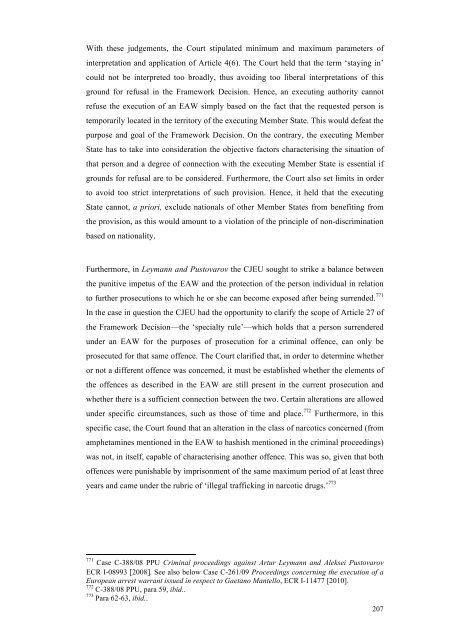The evolution of European Union criminal law (1957-2012)
The evolution of European Union criminal law (1957-2012)
The evolution of European Union criminal law (1957-2012)
Create successful ePaper yourself
Turn your PDF publications into a flip-book with our unique Google optimized e-Paper software.
With these judgements, the Court stipulated minimum and maximum parameters <strong>of</strong><br />
interpretation and application <strong>of</strong> Article 4(6). <strong>The</strong> Court held that the term ‘staying in’<br />
could not be interpreted too broadly, thus avoiding too liberal interpretations <strong>of</strong> this<br />
ground for refusal in the Framework Decision. Hence, an executing authority cannot<br />
refuse the execution <strong>of</strong> an EAW simply based on the fact that the requested person is<br />
temporarily located in the territory <strong>of</strong> the executing Member State. This would defeat the<br />
purpose and goal <strong>of</strong> the Framework Decision. On the contrary, the executing Member<br />
State has to take into consideration the objective factors characterising the situation <strong>of</strong><br />
that person and a degree <strong>of</strong> connection with the executing Member State is essential if<br />
grounds for refusal are to be considered. Furthermore, the Court also set limits in order<br />
to avoid too strict interpretations <strong>of</strong> such provision. Hence, it held that the executing<br />
State cannot, a priori, exclude nationals <strong>of</strong> other Member States from benefiting from<br />
the provision, as this would amount to a violation <strong>of</strong> the principle <strong>of</strong> non-discrimination<br />
based on nationality.<br />
Furthermore, in Leymann and Pustovarov the CJEU sought to strike a balance between<br />
the punitive impetus <strong>of</strong> the EAW and the protection <strong>of</strong> the person individual in relation<br />
to further prosecutions to which he or she can become exposed after being surrended. 771<br />
In the case in question the CJEU had the opportunity to clarify the scope <strong>of</strong> Article 27 <strong>of</strong><br />
the Framework Decision—the ‘specialty rule’—which holds that a person surrendered<br />
under an EAW for the purposes <strong>of</strong> prosecution for a <strong>criminal</strong> <strong>of</strong>fence, can only be<br />
prosecuted for that same <strong>of</strong>fence. <strong>The</strong> Court clarified that, in order to determine whether<br />
or not a different <strong>of</strong>fence was concerned, it must be established whether the elements <strong>of</strong><br />
the <strong>of</strong>fences as described in the EAW are still present in the current prosecution and<br />
whether there is a sufficient connection between the two. Certain alterations are allowed<br />
under specific circumstances, such as those <strong>of</strong> time and place. 772 Furthermore, in this<br />
specific case, the Court found that an alteration in the class <strong>of</strong> narcotics concerned (from<br />
amphetamines mentioned in the EAW to hashish mentioned in the <strong>criminal</strong> proceedings)<br />
was not, in itself, capable <strong>of</strong> characterising another <strong>of</strong>fence. This was so, given that both<br />
<strong>of</strong>fences were punishable by imprisonment <strong>of</strong> the same maximum period <strong>of</strong> at least three<br />
years and came under the rubric <strong>of</strong> ‘illegal trafficking in narcotic drugs.’ 773<br />
771 Case C-388/08 PPU Criminal proceedings against Artur Leymann and Aleksei Pustovarov<br />
ECR I-08993 [2008]. See also below Case C-261/09 Proceedings concerning the execution <strong>of</strong> a<br />
<strong>European</strong> arrest warrant issued in respect to Gaetano Mantello, ECR I-11477 [2010].<br />
772 C-388/08 PPU, para 59, ibid..<br />
773 Para 62-63, ibid..<br />
207
















